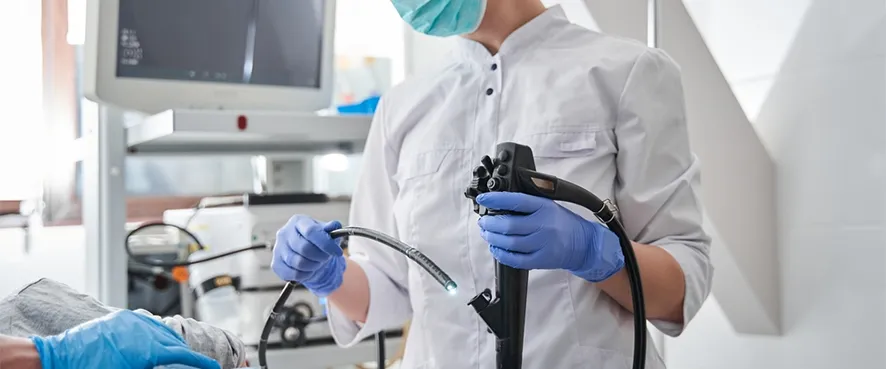Gastroscopy and Colonoscopy: Vital Methods for Investigating the Digestive System and Maintaining Health
In an era of rapid medical advancement, the technological innovations utilized for exploring internal organs and preserving our health play a pivotal role. Among the most crucial elements for investigating the digestive system are endoscopic medical procedures such as gastroscopy and colonoscopy.
Gastroscopy is a widely used medical procedure for visualizing and examining the upper part of the digestive tract. This procedure is conducted with the aid of a gastroscope—a thin and flexible tube. The endoscope captures detailed images of the internal organs through a camera situated at its tip. Subsequently, these images are displayed on a screen and analyzed by specialists.
The applications of endoscopy are diverse. It is frequently utilized for diagnosing and treating gastric ulcers, reflux disease, disorders of the biliary tract, gastrointestinal issues, and certain types of oncological conditions. Gastroscopy represents a minimally invasive method of examination, performed under sedation, during which the patient experiences no discomfort and can be discharged from the healthcare facility within hours of the procedure.
Colonoscopy is an indispensable method for investigating the lower part of the digestive system. It is a type of endoscopic procedure specifically designed for diagnosing disorders of the intestinal system. During this examination, a colonoscope—a long, flexible tube with a small camera at its tip—is inserted into the colon through the rectum. The camera, located at the tip of the colonoscope, enables physicians to visualize and carefully examine the intestines. Throughout this examination, doctors can identify issues such as polyps, inflammations, bleeding, or other anomalies and conduct biopsies if necessary. Colonoscopy is particularly crucial for screening and early detection of colorectal cancer. Similar to gastroscopy, colonoscopy is a minimally invasive procedure performed under sedation, ensuring patients experience minimal discomfort and can be discharged shortly after the procedure.
Importance of Gastroscopy and Colonoscopy
- Early Diagnosis: Early Diagnosis: These procedures enable the early detection of various conditions. Early diagnosis enables more effective treatment and may prolong life expectancy.
- Treatment: In addition to diagnosis, in some cases, gastroscopy and colonoscopy are utilized for therapeutic purposes. For instance, during colonoscopy, intestinal polyps can be removed, potentially preventing the development of cancer.
- Understanding Symptoms: These procedures can help determine the underlying causes of undiagnosed symptoms such as abdominal pain, bleeding, or weight loss.
- Minimal Invasiveness: Gastroscopy and colonoscopy are endoscopic procedures with significantly less invasiveness compared to laparotomy (open surgical intervention performed to examine abdominal organs). This translates to reduced pain, quicker recovery, and fewer complications for patients.
- Cancer Screening: Colonoscopy is considered the gold standard for colorectal cancer screening, enabling the detection and treatment of oncological conditions at an early stage.
Application Areas of Gastroscopy:
- Stomach and Esophageal Disorders: Gastroscopy is employed for diagnosing and monitoring disorders of the stomach and esophagus, such as gastric ulcers, gastritis (inflammation of the stomach), gastric bleeding, esophageal inflammation, reflux disease, and esophageal cancer.
- Biliary Tract and Pancreatic Disorders: Endoscopy is utilized for diagnosing issues such as gallstones, biliary obstruction, pancreatitis (inflammation of the pancreas), and biliary tract cancer. Endoscopic procedures can also be performed to remove stones and obstructions in the biliary tract.
- Stomach Cancer Screening: Gastroscopy can be utilized for stomach cancer screening. Particularly in individuals with suspected risk factors, cancer can be detected in its early stages through examination of the gastric mucosa.
Application Areas of Colonoscopy:
- Colorectal Cancer Screening: Colonoscopy is the gold standard for colorectal cancer screening. It is a routine procedure recommended annually for patients with a family history of colorectal cancer and individuals at increased risk. Through this method, polyps (precancerous growths) can be detected and removed when necessary.
- Intestinal Issues: Colonoscopy is used for diagnosing and treating intestinal problems. It is essential for diagnosing conditions such as irritable bowel syndrome (IBS), inflammatory bowel diseases (e.g., Crohn’s disease and ulcerative colitis).
- Gastrointestinal Bleeding: Colonoscopy is often employed to identify and treat the cause of gastrointestinal bleeding. It can diagnose conditions requiring surgical intervention by locating the source of bleeding.
- Intestinal Polyps and Tumors: Colonoscopy is utilized for early diagnosis and removal of intestinal polyps, as well as for diagnosing intestinal tumors.
- Monitoring Inflammatory Bowel Diseases: Colonoscopy is used to monitor inflammatory bowel diseases such as ulcerative colitis or Crohn’s disease and evaluate response to treatment.
Gastroscopy and Colonoscopy are integral components of modern medicine and play a vital role in maintaining health. These investigative methods are crucial for early diagnosis and treatment of various conditions. It is extremely important to adhere to regular medical check-ups and follow the recommendations of your doctor to maintain your health and promptly detect potential health issues. If you need a gastroscopy or colonoscopy, your physician will provide detailed information about the procedures. Remember, one of the most critical steps in maintaining good health is early detection, and gastroscopy and colonoscopy are powerful tools for this purpose.




